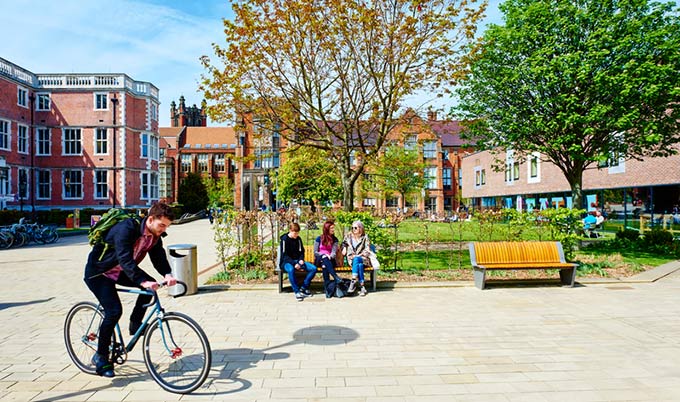Times Higher Impact Rankings 2022
University ranked first in the UK for sustainable development
Published on: 28 April 2022
Newcastle University’s ongoing work towards the United Nations’ Sustainable Development Goals (UNSDGs) has been recognised in the Times Higher Education Impact Rankings 2022.
First in the rankings nationally, Newcastle has also been placed eighth in the world, moving up from its position of third in the UK and 15th in the world in 2021.
The Times Higher Education Impact Rankings assess over 1,500 universities from around the world on action taken towards the UNSDGs. Institutions are evaluated across the areas of research, stewardship, outreach and teaching.
Professor Chris Day, Vice-Chancellor and President, Newcastle University, said:
“We are absolutely delighted to be ranked first in the UK – and eighth in the world - in this year’s Times Higher Education Impact Rankings.
“They represent the very best of what a University can be - working together to respond to urgent global challenges – and our performance today is a testament to the hard work and commitment of all colleagues and students at Newcastle University.
“This year’s rankings are particularly significant. We are increasingly seeing at first hand the positive impact that universities have in their cities and regions and the global significance that can be achieved through strong collaboration with partners.
“And as we start to move out of the pandemic and respond to other global challenges, universities will be crucial in building a fairer, stronger and more sustainable future.
“At Newcastle we have been working hard to embed our commitments to Social and Environmental Justice in everything we do and I am immensely proud of what we have achieved today.”

Fighting for climate justice
Briana Gordhan, Newcastle University Students’ Union Welfare & Equality Officer, adds: “New generations are growing up with eco-anxiety, feeling overwhelmed by the real and devastating impact of climate change. At Newcastle University, staff and students approach this storm together, continually collaborating on ideas and initiatives. Being part of a university committed to fighting for climate justice inspires us and gives us hope for what the future could be and its incredible to see these continued efforts publicly celebrated in this way.”
Entering across all 17 UNSDGs, Newcastle University scored highly in a number of areas including 8th place globally for its work towards SDG11: Sustainable Cities and Communities, which includes collaboration in the region and work towards arts and culture. The recognition reflects the city’s coordinated efforts, which led to Newcastle becoming the first city in the UK where all anchor institutions declared a Climate Emergency. Newcastle University works closely with partners in the city including the NHS Trust, City Council and Northumbria University through the Net Zero Taskforce, which is co-chaired by Hayley Fowler, Professor of Climate Change Impacts at Newcastle University.
Pam Smith, Chief Executive of Newcastle City Council, said: “We are incredibly fortunate in Newcastle to have two internationally-renowned universities that have a hugely positive impact on the city, and I would like to congratulate Newcastle University for being named the UK’s highest ranking university in THE Impact Rankings for 2022.
“It is of little surprise that their strengths in areas of sustainability and climate action have been highlighted in the rankings, with Newcastle University playing a key role in helping to shape our city’s wider plans for a cleaner and greener future for residents, students and visitors alike. There are countless examples of this commitment on show across the city, whether it’s the success of the forward-thinking Helix site, or Newcastle University’s leading role in declaring a climate emergency in the city and its position on our Net Zero task force.
“Newcastle University plays a significant role in so much of what makes our city such an attractive place to come and live and I’m delighted their success has been recognised in this way.”
Working together to respond to urgent global challenges
The University has a long-standing relationship with cultural venues in the city and the region. The University’s Great North Museum: Hancock and Hatton Gallery, managed in partnership with Tyne & Wear Archives and Museums, house exhibitions that are free for all to access and are integrated with the University’s research and education work. The University’s Centre for Research Excellence in Heritage brings together experts across a wide range of disciplines to deliver heritage research that will have an impact now and in the future.
Keith Merrin, Director, Tyne & Wear Archives & Museums (TWAM), said:
“We are very proud to work in partnership with Newcastle University and congratulate our colleagues on this well-deserved success.
“The Great North Museum: Hancock and Hatton Gallery are part of the cultural fabric of Newcastle. It is thanks to the University’s investment and custodianship that these vitally important spaces of curiosity, learning and debate are free for everyone to enjoy.”
The University’s practitioners are working with communities in the North East and around the world to explore climate change. They’re using art, film, photography, creative writing and more to engage young and old with the challenges facing our planet.
Phil Baty, Chief Knowledge Officer at THE, said:
“The Times Higher Education Impact Rankings are unique in examining universities’ impact on society, through each of the 17 United Nations Sustainable Development Goals. This year over 1,500 institutions from 110 countries took part in the ranking, stepping forward to demonstrate their commitment to helping to create a sustainable future for us all, and Times Higher Education examined data across hundreds of metrics and measurements, covering teaching, research, outreach, and indeed universities’ stewardship of their own resources – including their people.
“So Newcastle University’s position in the world top ten, and as number one in the UK, is an outstanding achievement. One of Newcastle’s great strengths is in SDG 11 – sustainable cities and communities – so the university stands out as a truly civic university, producing world class research to the benefit of all, but with a clear commitment to serving its local community too. That’s a wonderful social purpose.”
The University’s UNSDG Committee, chaired by Professor Phil McGowan, works towards raising awareness of the goals and placing their core principles at the heart of university activity.
The Global Challenges Academy brings together University colleagues and partners to find evidence-based solutions to the world’s most pressing development challenges and help realise the UNSDGs through Newcastle University’s world-leading research.
The University is ranked 10th in the world in SDG12: Responsible Consumption and Production, and 26th for work towards SDG13 Climate Action. Since the launch of the University Climate Action Plan in June 2021, the University has accelerated action towards tackling climate change and is investing £15 million per year on projects to decarbonise its use of heat and power towards meeting its commitment of net zero by 2030.
During COP26, Newcastle University launched Climate Leadership scholarships as part of ongoing work to embed climate change education across the institution, helping students to prepare for their roles in work and wider society.
The rankings highlight Newcastle’s global research impact and commitment to issues of social and climate justice. It is the only UK university to secure two UKRI-funded Global Challenges Research Hubs – The Living Deltas Hub and Water Security and Sustainable Development Hub.



